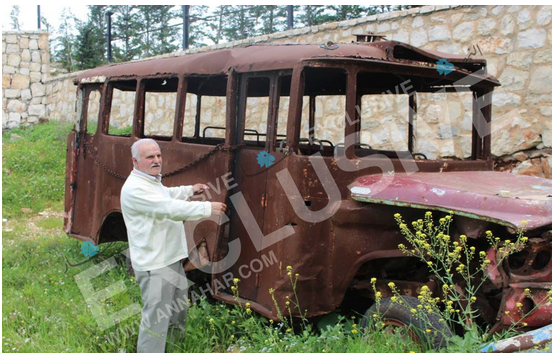Marhaba! One major lesson from this remarkable story in the previous post is a constant struggle for war torn societies to be able to rehabilitate themselves after the guns of war have silenced. Sami Hamdan’s story in the article reflects how many people in most war-torn states are looking for ways to commemorate the end of something devastating so that future generations can never repeat the same mistakes. In this post, I want to provide you with the answers to the reading comprehension exercise, and another beautiful song about rebuilding Lebanon and the spirt of reconciliation after the civil war! This folkloric ballad by Zaki Nassif is called Reji’ Yit’amar Libnen (راجع يتعمر لبنان) which rough translates to ‘Lebanon Will be Revived/Rebuilt.’ Enjoy this beautiful ballad.

Screenshot from Annahar Article
Answers:
1. Its importance lies in its link to the black day that historicized the beginning of the civil war.
أهميتها تكمن بالربط بينها وبين اليوم الأسود الذي أرّخ لبداية الحرب الأهلية
2. The current bus owner is Sami Hamdan.
مالك البوسطة الحالي سامي حمدان
3. He is certain with all confidence, that he learned to read by himself through reading newspapers during the civil war.
يؤكّد بكامل الثّقة أنّه تعلّم القراءة بنفسه، من خلال مطالعة الصّحف خلال الحرب الأهليّة
4. He wants to leave it to die with time because it’s death means the death of the Lebanese war.
يريد أن يتركها لتموت مع الزّمن، لأنّ موتها يعني موت الحرب اللّبنانيّة
5. It’s value may be little to you, but for me, it is worth a million dollars (US).
قيمتها قليلة بالنّسبة اليك، لكن بالنّسبة الي، تستحقّ مليون دولار أميركي
6. Translate the following sentence to English:
من هنا بدأت ومن هنا انتهت، لأنّ البوسطة ترمز لبداية الحرب، وعلينا انتظار زوالها لكي تزول الحرب اللّبنانيّة
Here it began and from here it ended, for the bus symbolizes the beginning of the war, and we have to await its decay for the Lebanese war to fade away.
https://youtu.be/zivFhWo5zFY
For now take care and stay tuned for upcoming posts!
Happy Learning!
Have a nice day!!
نهاركم سعيد





